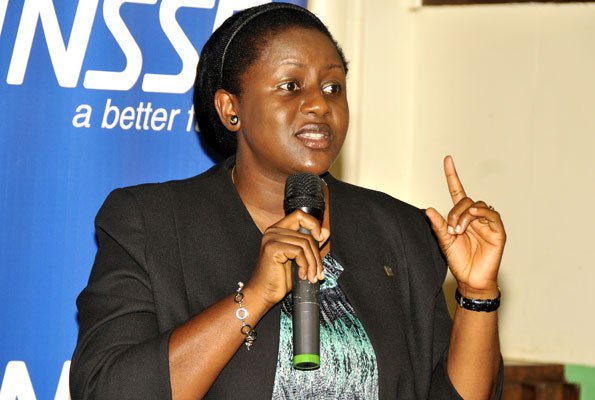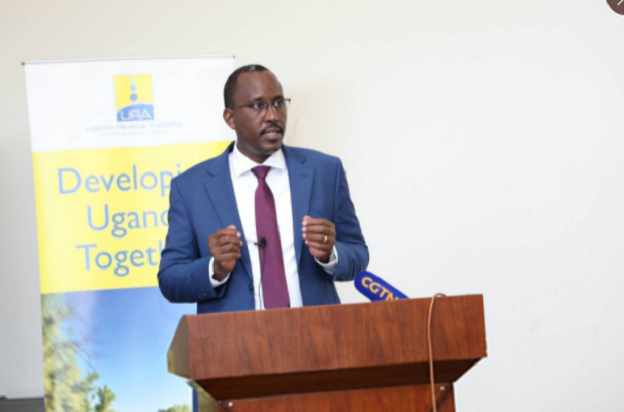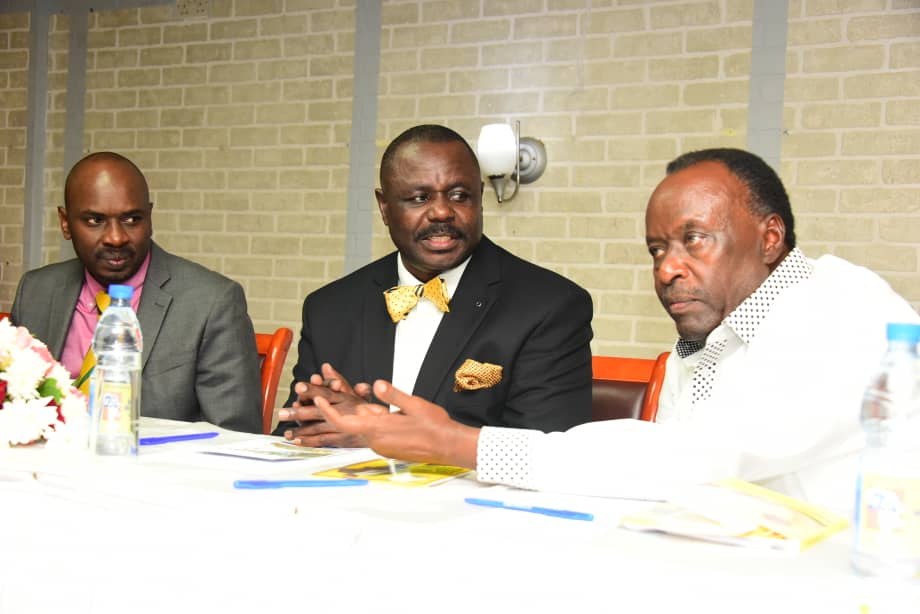Former National Social Security Fund (NSSF) Deputy Managing Director, Geraldine Ssali Busuulwa (pictured) has weighed in on the debate whether the Fund should honour 20% midterm payment to each saver.
This week NSSF MD, Richard Byarugaba wrote to the Minister with regards to the Covid-19 relief for its members: Paying of 20% of each member’s balance.
In her written opinion to Finance Minister, Ssali says “I’m not sure if the minister also asked Management to indulge in the Macro economic impact of this “transaction” but I think that would be MoFPED and Central Bank to competently handle Macroeconomic policy and give the final position. NSSF management should concern themselves with their primary strand of responsibility- providing social security to its members.”
She adds: “There’s a school of thought on the theory of the half glass. Basically stating that the Optimistic mind (sighting opportunities and possibilities) sees the glass half full and the Pessimistic mind(seeing difficulties, impossibilities and challenges) will always see the same glass half empty! A quick scan of the document would suggest the Fund’s managers have decided to fall under the later, in order to discourage such a proposal from ever seeing the light of day. An optimistic Fund manager on the other hand would have used this opportunity to (“do what it says on the tin”) and entice/attract a bigger (including voluntary savers) membership to the Fund by demonstrating their relevance and usefulness to existing members at such a time when most governments are extending financial assistance to their vulnerable citizens in form of social welfare programs…”
She explains that the Shs380m NSSF gave to the National Task Force efforts under the Prime Minister’s office was appreciated by the country at large but now its core members need NSSF support for some of their money to bail them out as they struggle to sustain their families and meet their day to day obligations.
“The Fund management in citing dire negative economic consequences is stealthily and technically avoiding their natural responsibility – The purpose and cause on which NSSF was formed. Any systemic economic risk that was meant to happen due to the global pandemic, Covid-19, is happening right now and there’s nothing NSSF can do about it. This risk is already crystallizing in the Ugandan market and every player in the market will feel its heat! So whatever must go wrong is going wrong as we speak. However, the non- systematic risk anticipated by the Fund managers prior to Covid- 19 can be hedged by simple instruments going forward,” she explains.
For example, she says, if the treasury desk officers finds that their asset interest rates are falling, they can acquire a liability whose interest rate will offset any loss on that asset.
“There are simple Zero cost financial instruments being offered by banks in our market like Stanbic, Stanchart, Equity and the like. I’m fully aware that the Fund has got a risk management framework, that takes into account scenarios and simulations like “a run on the Fund” and any competent crisis management plans would have been put in place to cater for such contingencies as standard procedure for any given financial or quasi financial institutions in this market,” she adds.
So the net Cash of Shs2.5 Trillion needed within the next one year (12 months) to fulfill this obligation, boils down to affordability, without any political innuendo or undertones, Ssali says.
Why NSSF should pay 20%
She explains that in order for NSSF to fulfill the liquidity needs of 20% of member balances alluded to, they would need to look at their liquidity position.
“First the Shs125bn tacked away in reserves for a rainy day; it’s raining now! Secondly, the Current assets at about Shs280bn are immediately available if they chose to operate an Accident and Emergency system – it attends to the most fatal not who came first or who is more important. Like a case by case basis. Secondly, those Government Securities held by the Government of Kenya that are over a Shs 1 Trillion! In a nutshell, this is Ugandan saver’s money being used to build Kenyan infrastructure, and this is okay! Thirdly, a phased liquidation of their treasury bills, bonds and Fixed deposits within the Ugandan market,” Ssali explains.
She adds: “This assured fixed income albeit with different maturity tenures falling under 3 – months, 6- months, 1- year, 5 years, 10- years, etc. They would have dive in and look at these assets concurrently with the monthly contributions they collect from members. These assets never have the same maturity times. This asset class accounts for over 70% of the whole investment portfolio of NSSF so a phased transaction can be used to cushion any negative effects anticipated on this asset class alone without needing to touch the real Estate and Equities classes. The payments required for the fulfillment of the contractual obligations under the real estate contracts ( which contracts normally span over 5-years plus, are already planned for and fall under business as usual. Management is not required to pay 100% of these obligations upfront in one year and each contract has pre-negotiated terms in case of delayed payments. Never mind that an average NSSF saver will not be able to afford those houses for example in Lubowa.
You heard right, 75% of the Fund is owned by 100K members (who are 4% of members) who probably already own homes anyway. This lot may not even need their 20% at this time. The Fund collects Shs100bn cash from savers every month and only approximately 3% of this goes to paying monthly benefit claims to members. The rest of the cash can also be added on the 20% settlement.”
There’s an artificially amplified impact on the Ugandan economy. Uganda’s GDP alone without crossing to the rest of East Africa is currently USD 27.46Bn (Shs92.7 Trn).
“The UGX 2.5Tr (20%) is a mere 3% of this but would still be spent and re-invested within the economy by its members without significant economic leakages. This is still a boost in the economy because more money in circulation to buy goods in the market. The impact of this pay out on exports as NSSF suggests is decimal because no one knows for sure how much of that money once paid, would be channeled towards exports, sufficient enough to cause an impairment on our Balance of Trade/Payments position as a country. Uganda’s economy is said to be growing at 6% p.a. Core inflation is currently running at 3.4 % and with all the projected doom as a result from Covid -19; is projected to stand at 4.6% in 2021! A difference of only 1.2%. Uganda has in addition along all the other EA countries got a lot of external budgetary support coming to a total of Shs3.2 Trn,” she explains.
She adds that the total effect of all this should be enough to mitigate any shock in the market resulting from a cash outflow of Shs2.5 Trn.
“From a human perspective alone, when I weigh the cost of defaulting on a real estate project, the so called “damage” to the east African securities markets, the sell of securities at a discount against the UGX 2.5Tr ( 3% of GDP) and the Financial reporting implications alluded to by the Fund’s management AGAINST the need to bail out Fund members with a small amount of their own hard earned savings needed to survive, I feel the very purpose of the Fund’s existence has been obliterated the inept mindset of the Fund’s management that’s contingent on chance survival and smoke screens!” she says.
Ssali says it’s her strong view that management at this stage must remind themselves the very justification of NSSF’s existence – to provide a social security safety net for its members whenever their social security is under threat, not single handedly trying to save the East African Economy as they would like us to believe (sec 2.2 of the letter).
“Besides, year on year, members are reminded how NSSF Uganda is the largest Fund in East Africa. This statement is always met with a Thunderous applause from its members and the public at large. But what does this exactly mean to a layman who has been contributing to NSSF for the last 20 years? NSSF has to walk the walk and talk the talk! This is the time for members to size up this “largest” Fund in EA,” she says.
She emphasizes that the Fund has sufficient headroom on profitability to play in the Fixed Income asset class without the need to call on the rest of its real estate and Equities portfolios.
“The Fund can afford this transaction especially if it’s staggered over time without causing any significant negative impact. The powers that be should find the political will to pull down this facade painted by NSSF management and pay the 20% especially to those members that need it most first. A rejection of this proposal would be anything but economic!” she concludes.






The law was made to protect the savers funds from being misused by the managers by restraining them from undesirable ambitions that are risky to the fund. This law was not intended to stop nor prohibit savers accessing their money in times of life and death like this one, where rescue action, of fund owners, is only relevant to save their lives .
MD should avoid motivational speaking tone, most especially when savers’ lives are at stake.
Very informative articles..keep it up
Thanks Geraldine for this insightful information,I totally agree with you, As you clearly stated,If indeed this is still the sole reason for NSSF’s existence – “To provide a social security safety net for its members whenever their social security is under threat”, then, as Accountants, how do we professionally lead our fellow members to ensure NSSF management acts for its members and not for its masters at the expense of NSSF members??.
Surely, everything or scenario happens for a reason. In this case the so called management at nssf is fully exhibiting incompetency in executing their obligation, now it is the powers that are to force them work or resign their positions. A bright and sorber mind should be at that organisation but the so called powers will always force you out, I am of the view this whole thing should be disbanded after this situation. Otherwise it would be counter productive if it does totally nothing during this rainy day. It is the savers money not organisation money! Let the savers get when they really need it like now.
I really respect Geraldine’s argument. It holds some water. The fund is meant to save member’s threatened social security, and now it’s seemingly threatened beyond one’s doubt. Therefore Mr Byarugaba should work in the interest of the members and the intended purpose of the fund
I read the MD’ s letter. Surely, former Deputy MD has put more light. It is raining now and the that reserve a/c to be part of the solution!
We request the Nssf to look at how our families are suffering yet we have money kept by nssf.The should give us support as our bank at the moment
This is the fact,the lady worked there and she knows all avenues.
I still feel Byarugaba embezzled the money,so he knows that disbursing that money will lead to complete closure of NSSF